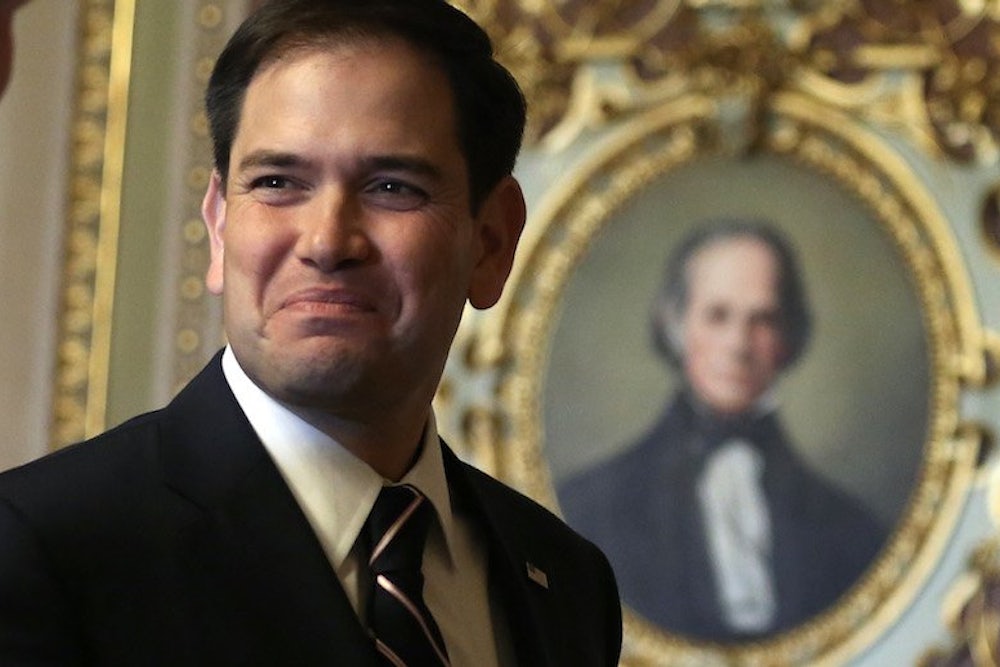It has been fascinating to watch Marco Rubio over the past year as he has flip-flopped, vacillated, and spun—all in the service of digging himself a deeper hole with both Republican primary voters and establishment centrists. He has managed to piss off the right on immigration, and then flip-flopped in such opportunistic fashion that he has angered his onetime Senate allies who wanted a comprehensive bill. What is a guy to do after such a disastrous 12 months? Apparently the answer is to give a big speech on foreign policy, laying out your bold worldview, and confronting the challenges America faces in a new uncertain era. (This is the style that such speeches demand).
Anyway, the big speech was two weeks ago. His press office hyped it, the media covered it, and the man himself delivered it with much fanfare. The speech didn't say anything noteworthy, however, and Rubio's stated attempt to find a middle ground between the hawks (e.g. Chris Christie) and the doves (e.g. Rand Paul) was devoid of specifics. But here we are two weeks later and guess what? Rubio gave another "major" address on foreign policy, in London, where The Washington Post reports:
At a time of vigorous debate within the Republican Party about the United States’ global role, the first-term senator from Florida is articulating a worldview that places him neatly between the GOP’s tea-party-led isolationist wing and its more established interventionist wing.
What does this mean in practice?
“I actually reject those two spectrums,” Rubio said. “That talk of hawks and doves is 20th century Cold War language that no longer applies. I believe in a strategic foreign policy. A strategic foreign policy has a toolbox that has at your disposal diplomacy, foreign aid, soft power, military power, all sorts of things.”
All sorts of things. In his previous speech, he said essentially the exact same thing:
Meanwhile, at home, foreign policy is too often covered in simplistic terms. Many only recognize two points of view: “doves”, who seek to isolate us from the world, participating in global events only when there is a direct physical threat to the safety of our homeland; and “hawks”, who believe we should use our mighty military strength to intervene in response to practically every crisis.
These labels are obsolete. They come from the world of the past.
As Daniel Larison points out, and as I argued when writing about his last speech, Rubio is essentially a run-of-the-mill Republican hawk. To try and pretend that he occupies some middle-ground is nonsense. The Post story not only fails to make this point; it also adds support to the idea that merely giving a speech is a way of establishing credibility. For example:
“He’s in the process of dealing with the fact that he’s 42 and could pass for 32,” said Steve Schmidt, a strategist on past Republican presidential campaigns. Schmidt added, “He is working to build a reputation for seriousness and thoroughness and thoughtfulness on foreign policy issues that go beyond the typical Republican talking points on Israel or the war on terror.”
Right, except the speech didn't include anything new. More:
Richard Williamson, a former assistant secretary of state who was one of Romney’s top foreign policy advisers during the 2012 campaign, said that Rubio “is being shrewd to build up this pillar of his résumé and stake out a position as a responsible adult voice.”
A translation of Williamson's point would be that by giving a vacuous speech, Rubio is building his résumé, which will thus impress people like Williamson, who will say as much to the news media in 2015 and 2106.
P.S. The Post story notes that it is rare for politicians to criticize the president, as Rubio did about Syria and Iran, when on foreign territory. In this globalized media age, however, such a norm seems even sillier than it surely did 50 years ago.
